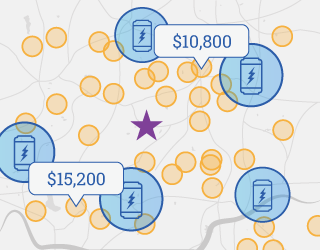Absorbed glass mat (AGM) batteries have traditionally been used as car batteries, but in certain cases, they can be a solid choice as an energy backup system or paired with solar panels. In this article, we’ll discuss what AGM batteries are, and when they might be the right choice for you.
What are AGM batteries? How do they work?
AGM batteries are a type of lead-acid battery that have traditionally been used in cars. Recently, technological advances have made them usable for solar-plus-storage setups as well.
AGM stands for absorbed glass mat, which is one of the main physical differences between AGM batteries and traditional flooded lead-acid batteries used in cars. We’ll spare you from the extensive details of everything that separates these two battery chemistries, but it’s important to know that the absorbed glass mat technology allows for more power to be packed into a lead-acid battery housing.
Chemically speaking, AGM batteries release energy by breaking apart oxygen and hydrogen molecules. When storing energy, these batteries recombine the oxygen and hydrogen in their cells, which is why AGM batteries are also a member of the “recombinant” battery family.
AGM vs. standard batteries
The biggest difference between AGM batteries and standard lead-acid batteries is the level of maintenance they require. AGM batteries are completely sealed, and you’ll never have to check water levels or deal with expelled gas like you would in a traditional flooded lead-acid battery product. This makes AGM batteries generally a safer lead-acid option, as you can set them and never touch them again (until you need a replacement).
If you’re curious how standard lead-acid batteries generally compare to lithium-ion options, you can check out our lead-acid vs. lithium ion batteries overview.
Can you pair AGM batteries with solar panels?
In recent years, deep-cycle AGM batteries have become available on the market. Like other deep-cycle lead-acid battery options, deep-cycle AGM products can be a solid choice to pair with a solar panel system in select cases. However, for most residential solar panel installations, you’ll want to explore lithium-ion batteries like the Tesla Powerwall or LG Chem RESU to keep up with the high energy input from a solar panel system, as well as the high energy demands of a household.
AGM batteries are particularly useful for small, off-grid solar systems. For example, a remote cabin with low energy demand and a small system on the roof may be the perfect candidate for an AGM battery bank. No maintenance is needed, and the relatively low upfront cost of lead-acid batteries in general makes AGM batteries ideal for these smaller, off-grid setups.
Compare your solar-plus-storage options on EnergySage
Not sure how to start comparing your solar and storage options? A qualified EnergySage-approved company can give you the best recommendation about the right battery system and other energy storage options for your unique setup. If you are interested in receiving competing installation quotes for solar and energy storage options from local installers near you, simply join the EnergySage Solar Marketplace today.






